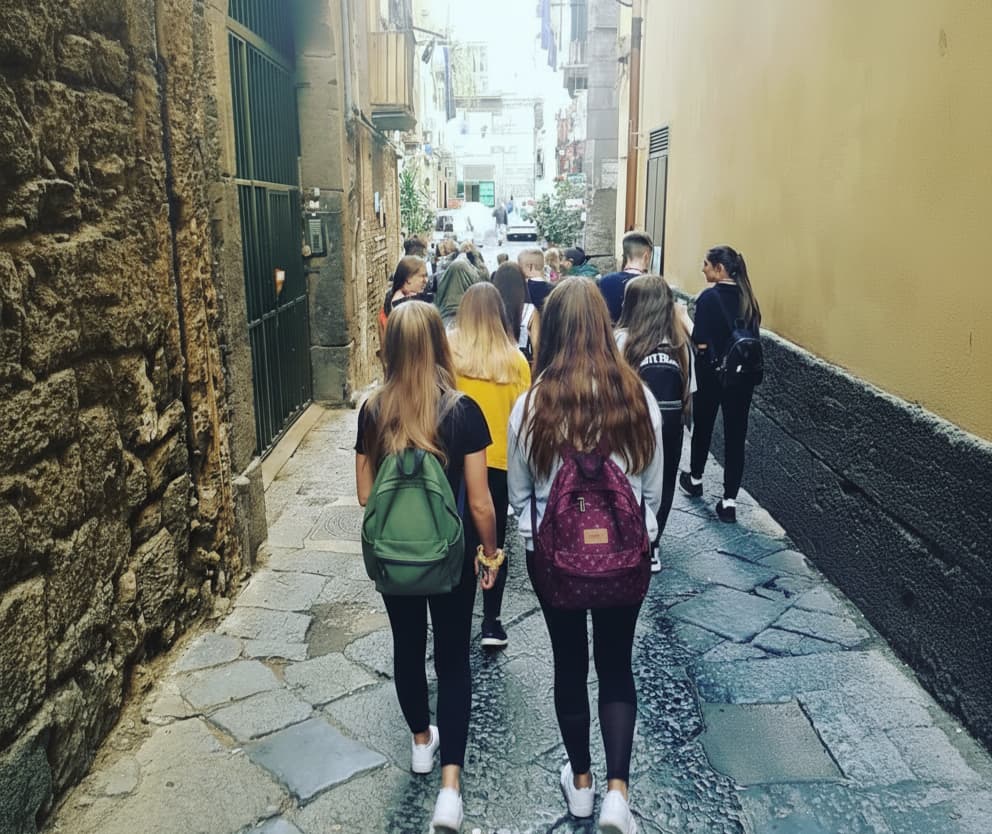Top 6 Things SLTs Look for in a School Trip Proposal

Calculate your school Travel Insurance costs
Use our calculator to find out how much it will cost to add travel insurance to your tour.
At Adaptable Travel, we’re aware of how important your school's Senior Leadership Teams (SLTs) are in making educational trip decisions. Behind every successful trip lies careful planning and rigorous oversight. In England and Wales, SLTs have a critical responsibility to ensure that all trip proposals not only offer value to pupils but also comply with legal requirements and trust policies. Whether you're a teacher planning your first trip or an experienced trip leader looking to refine your approach, understanding what SLTs need to consider can make your planning smoother and more effective.
Throughout, we’ll break down what SLTs look for when approving school trips, what statutory and trust-level obligations need to be met, and how you, as the trip lead, can align your proposals to meet these expectations from the start.
1. Clear Educational Objectives and Curriculum Relevance
The starting point for any school trip proposal must be why the trip matters educationally. SLTs want to see a clear, well-evidenced link between the trip’s activities and your school’s curriculum or enrichment goals. This is more than a tick-box exercise; it’s about demonstrating how the trip will extend classroom learning and contribute to students’ educational development.
Explain how the trip builds on curriculum content, develops key skills, or supports examination topics. Whether you're visiting a WWI battlefield for GCSE History or CERN in Geneva for KS4 STEM learning, SLTs will want to see explicit learning outcomes.
To help with this, it can be a good idea to use Ofsted’s Education Inspection Framework to connect the trip to personal development or SMSC (Spiritual, Moral, Social, and Cultural) outcomes, particularly for enrichment-focused proposals. ‘SMSC is about helping students develop a range of personal and social skills that will enable them to become well-rounded, responsible, and engaged members of society.’ (https://www.votesforschools.com/blog/smsc/#policy)
Top Tip: Use your school’s curriculum documents, Ofsted Frameworks, or department improvement plans to frame the trip’s relevance.
2. Robust Health & Safety and Risk Management
SLTs have legal and moral responsibilities to ensure student and staff safety—so robust risk management is non-negotiable. Proposals must include proportionate, site-specific risk assessments and demonstrate a proactive approach to safety.
Trips involve variables that are not present within the school environment, such as unfamiliar locations, transportation risks from air to coach travel, and new activities. SLTs require evidence of proportionate and well-documented risk assessments to anticipate and minimise these risks.
For example, the Department for Education (DfE) guidance explicitly states that schools must use risk assessments for trips “not covered by a school’s current policies… [including] distance from the school, type of activity, location” (GOV.UK). This ensures all unusual or higher-risk factors are considered.
Not only this, but a thorough health and safety plan gives confidence to parents, carers, and school staff that the trip is well-organised and safe. Robust health and safety planning is essential for getting consent and support. Managing risks effectively helps to ensure trips are successful and enriching, rather than disrupted or cut short by preventable incidents.
Top Tip: TourTrust is Adaptable Travel's comprehensive school tour safety system, designed with the well-being of your students at the heart of every educational trip. We can provide you with in-depth risk assessments for every aspect of the trip, covering transport, accommodation, and various activities. See more here.

3. Appropriate Supervision Ratios and Staffing Competence
Staffing arrangements must be appropriate to the group’s age, needs, and the complexity of the trip. SLTs will look closely at who’s going and whether the trip is adequately supervised. At Adaptable Travel, we advise a 1:10 ratio for trips as standard. This can vary depending on whether it is a primary school or an SEN group.
Department for Education guidance suggests primary ratios of around 1:6-10 and secondary ratios of around 1:10-15, adjusting for complexity or overseas travel.
Amongst the ratio, it’s important to indicate who the designated group leader, first aider, and safeguarding lead are, as well as whether support staff (e.g., SEN TAs) are included. SLTs closely review adult-to-pupil ratios tailored to age, setting and branching tasks.
As explored by the OEAP (lead body for guidance, advice and training related to outdoor learning and educational visits in England and Wales), a key element of the management of visits and activities by establishments is the training, deployment and support of leaders, ensuring that they are accountable, competent and confident, and that the ratio of leaders to participants is sufficient for effective supervision.
Example guidance from one institution's policy notes that a ratio of 1:10 should not be exceeded for all visits abroad, with a minimum of two responsible adults in attendance, whatever the group size, and a ratio of 1 adult to 8 on higher risk activities, e.g., those of a less regular nature – Bristol Metropolitan Academy Guidance.
Top Tip: Ensure all roles are catered for within the staff assignment. Briefly outline any special training (e.g. first aid or behaviour support) that trip staff hold, to add credibility.
4. Evidence of Provider and Insurance Credentials
SLTs require assurance that third-party providers hold relevant credentials, as well as assurance that the travel provider and all third-party activity providers meet high safety standards, are financially secure, and are fully insured.
For example, for overseas or flight-based trips, your travel provider must be ATOL-protected if the package includes flights. These affiliations ensure that in the event of the provider ceasing operations or facing disruption, your school and families will not be left out of pocket or stranded
ABTA (Association of British Travel Agents): Provides financial protection for land and sea-based travel packages.
ATOL (Air Travel Organiser’s Licence): Ensures financial protection for flight-inclusive packages. You can read about our financial protection here.
The correct financial protection and affiliations are a key requirement for SLTs and governors when approving international travel.
At Adaptable Travel, we take these responsibilities seriously. All our tours are operated under full ABTA and ATOL protection. We work only with vetted partners who hold the necessary insurance, licences, and staff qualifications. We’re happy to provide all documentation in advance so you can build a comprehensive and confident proposal for your SLT.
Top Tip: At Adaptable Travel, we’re fully ABTA/ATOL bonded, and all our providers meet national safety standards. We can include documentation for your SLT pack.
5. Transparency on Cost, Funding and Parental Access
School trips are a significant investment for both schools and families. As such, SLTs must be reassured that every element of the trip's cost is carefully considered, transparently communicated, and aligned with the school’s commitment to inclusion, equality, and financial responsibility.
SLTs will expect a clear financial plan that covers:
- Pupil cost breakdown
- Staff places
- Insurance, VAT, contingencies
- Any bursaries, pupil premium support, or subsidies available
Referencing your school’s equity policy can help frame your proposal as inclusive. For example, Kingswinford Academy policy advises sensitivity to affordability and inclusion: “The Cost of School Trips… some parents/carers have financial constraints … it might be possible for those students who receive the Pupil Premium to get help” (Kingswinford Academy.)
Top Tip: At Adaptable Travel, we offer flexible payment plans to include first and second deposits, breaking down payments for families, without requiring large, upfront costs. If you require specific payment plans, we can adapt deadlines where possible to suit your needs, too.
6. Authorisation Pathway and Procedural Compliance
Trips need to be planned with enough time in advance for approval to take place. We advise putting the plans in motion as soon as possible. SLTs need clarity on the internal approval process, planning timeline, and sign-off checkpoints.
SLTs and governing bodies typically require explicit written approval before deposits can be collected, or bookings made. Many schools use a two-stage approval system:
- Outline Approval – to explore feasibility, e.g., gathering quotes
- Full Signoff – to confirm full risk, staffing, and finance details
SLTs will also want to confirm:
- How and when parents will be informed
- Whether consent forms are in line with school safeguarding policies
- That medical and dietary needs are logged and stored securely
Many SLTs require trip leaders to meet families for overseas or residential trips before departure; therefore, it’s essential to build this into your plan as well. Typically, overseas trips will have one or two parents' presentations.
As many boards only meet half-termly, the process can be delayed quite significantly if the trip proposal is not raised well in advance.
Conclusion and Practical Takeaways
In summary, SLTs want reassurance that your trip is safe, educational, inclusive, and compliant with relevant regulations. A successful school trip proposal typically includes:
- Clear learning objectives linked to curriculum goals
- Comprehensive risk assessments and safety plans
- Suitable staffing and supervision ratios
- Verified providers with insurance and licenses
- Transparent budgeting and funding sensitivity
- A clear authorisation pathway aligned with trust policy
- Plans for strong communication with parents and students
Adaptable Travel works hard to make your life as a group leader as easy as possible. Our proposals cover all SLT requirements with links to further resources we provide to enhance your SLT proposal.
Get in touch and see how we can help you today with your school trip.
| Section | Benefits | Cover Limits | Excess |
|---|---|---|---|
| 1 | Cancellation or curtailment charges Aggregate limit Excursions | £2,000 £50,000 £250 | £50 (£20 loss of deposit) |
| 2 | Emergency medical & other expenses Emergency dental treatmentReplacement group leader | £5,000,000 £250 £5,000 | £50 |
| 3 | Personal accident 1. i. Death benefit (aged under 16) Death benefit (aged 16 to 64) ii. Loss of limbs or sight (aged under 16) Loss of limbs or sight (aged 16 to 64) iii. Permanent total disablement (aged under 16) Permanent total disablement (aged 16 to 64) 2. Death benefit (aged under 16) Death benefit (aged 16 to 64) | £2,500 £5,000 £12,000 £24,000 £15,000 £30,000 £2,500 £5,000 | £0 |
| 4 | Baggage (Including valuables) a) Single article, pair or set limit b) Valuables limit in total Group Equipment | £800 £200 £300 £750 | £50 |
| 5 | Group money, passport & documents 1. a) Currency, notes and coins b) Other group money and documents 2. Passport or visa | £500 £500 £200 | £50 |
| 6 | Personal Liability | £2,000,000 | £100 |
| Section | Benefits | Cover Limits | Excess |
|---|---|---|---|
| 8 | 1. Delayed Departure 2. Cancellation of trip (after 12 hrs) | £20 per 12 hrs up to £100 £2,000 | £0 £50 |
| 9 | Missed departure | £500 | £50 |
| 10 | Hospital benefit | £15 per day up to £300 | £0 |






.png)




%202%20(1).png)




